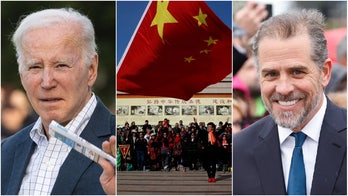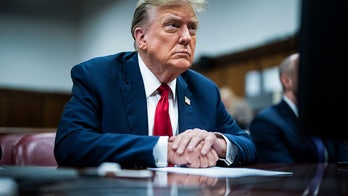Palau says its decision to temporarily take the 17 Uighurs, or Chinese Muslims, being held at the Guantanamo Bay prison was a "humanitarian gesture."
But the South Pacific island may have been motivated more by 200 million other reasons.
Two U.S. officials told the Associated Press that the U.S. was prepared to give Palau up to $200 million in return for accepting the Uighurs and as part of a mutual defense and cooperation treaty that is due to be renegotiated this year.
Figures on Palau's federal budget weren't immediately available, but if it is close to its size in 1999, when it was $71 million, the deal with the U.S. would in effect more than double the nation's spending and make it the fastest growing economy in the world.
In announcing the decision, Palau President Johnson Toribiong sounded as if the U.S. was doing his country a favor by sending the detainees there.
"I am honored and proud that the United States has asked Palau to assist with such a critical task," he said in a press release. "This is but a small thing we can do to thank our best friend and ally for all it has done of Palau."
But the move has riled some lawmakers.
"The Obama administration has still failed to present a credible plan for closing Guantanamo Bay by its self-imposed deadline, but paying $12 million per-head to send trained terrorists to an island paradise hardly seems like a good one," said Rep. Pete, Hoekstra, the top Republican on the House Intelligence Committee.
"There are many questions the administration must answer including what guarantees it has that the Uighurs will stay in Palau once freed and what plans are in place to keep them from linking up with the radical-jihaddist separatists operating a short distance away in Indonesia and on the Filipino island of Mindanao?
"Without solid answers to these questions, American is left with the first of many bad solutions to a problem solely of the administration's creation."
The 17 Uighurs are members of a Muslim group from China that received weapons training in Afghanistan so it could fight the Chinese government, according to U.S. officials. If they were sent back to China, U.S. officials worry they could face torture.
But the U.S. government has struggled to identify countries willing to accept the Uighurs. Now the Uighurs will join a population of nearly 20,000 and enjoy gorgeous weather in Palau where the average temperature is 81.6 degree.
The tiny nation, which has a GDP of nearly $170 million, relies heavily on tourism for revenues. More than 79,000 tourists visited last year and they spent $111.9 million in 2007.
Palau was once a trusteeship administered by the U.S. but it became independent in October 1994. The U.S. and Palau then entered into a Compact of Free Association, which a senior State Department official said plays no role in "any other discussions we might be having with the government of Palau."
Palauan citizens can travel to the U.S. without a visa and seek employment or education. It is unclear whether the Uighurs would enjoy the same perks once they are released.
The State Department did not return a call seeking comment, and no one in the Palauan government could be reached.
FOX News' Mike Levine and The Associated Press contributed to this report.




